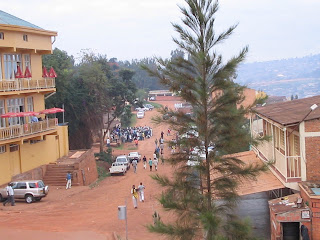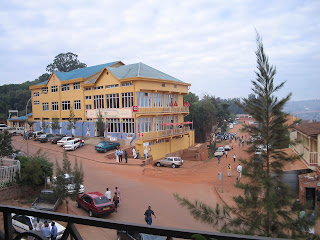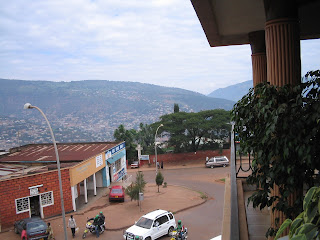Anyway, at the clinic I finally met Simon who's the financial director of WE-ACTx and we talked about the project I'm doing with my partner, Nina, who's a med student from Northwestern. We'll be giving out questionnaires and conducting small focus groups with HIV+ women who are eligible to be on medication, most of whom are, but we're looking at medicinal regimen compliance and what factors contribute to why these women might be inconsistent with taking their medications. (minus 2 points for a run-on sentence.) Another project I was encouraged to design/work on is a pilot module for sex ed for adolescent girls and boys and discuss some of the cultural issues that we see happening here. The kids that are enrolled and seen at WE-ACTx are amazing kids that have access to a great deal of staff members who are fabulously kind and generous with their love and time. Part of the problem is that the girls face a much different reality than some of the boys and they don't feel comfortable talking in front of them and some of the male counselors. For example, another intern found out a few weeks ago that many of the adolescent girls are prostituting themselves for money for their families as suggested by their mothers who, at one time, were also prostitutes. These girls also reported very young sexual experiences with their boyfriends and talked about familial sexual abuse. Clearly these girls will not be able to prevent sexual abuse in many cases, but there are things they can do to protect themselves from getting additional strains of the HIV virus. So, I'll be searching (While God's greatest gift was love, google comes in a very close second) for modules that were used elsewhere and then presenting them as a pilot and having it translated to the girls. After the session, we're all going to talk about what can be changed, what they already knew, what questions they would like to see answered in it. We're truly hoping that the young Rwandans will help open up the dialog about sexual practices and HIV in this country, especially with respect to family planning.
This afternoon I went attended a support group for women who have children who are HIV positive. All of the mothers that attend are positive as well, which is how most of the children got it. There was one grandmother there that pulled out a photograph of her and her grandchildren to show us all of them, I think 8 total. Leave it to Grandma's to bust out the pictures! (Hi Grandma!) A couple of topics came up today and everything was translated for the interns so we could comment, ask questions, and contribute. We started with breast feeding and the risk of passing HIV on to the babies, because two mothers had infants with them today (Cutest babies ever!) We talked about their fears, alternative solutions, and other mothers gave advice. The problem with this is that, while many women have access to drugs to reduce the chances of mother-to-child transmission at birth, this does not extend to breast milk after birth. The of HIV infection through breast milk is about 10%, which is very significant. So the easy solution would be to say, stop breast feeding. Well, that's nice but then they'd starve or die of terrible dysentery. The water supply is not clean enough to use to mix with formula and normally children receive antibodies from their mothers during breast feeding and naturally from within their own bodies as they grow. These antibodies help fight off some diseases found in the water and help keep them strong so that they can avoid a serious case. Oftentimes, the water supply is so dirty that cholera and other diseases claim the lives of a large percentage of young children. So again, it comes down to the economics of poverty.
Another woman told us her story and the group leader and herself asked my opinion. She was a prostitute and became HIV+ to support her family when her husband was trying to find work and eventually passed it to her child. She didn't tell him this, but there were rumors in her neighborhood that she was HIV+ along with her child. She is no longer living with her husband and they both love each other and he wants her to stay with him, but she feels ashamed returning to his house, and doesn't want anymore children to be born HIV+. She never told him her serostatus herself and asked me what I thought she should do. She also added that she feared if she told him, he would hurt her and her child, but she doesn't want to lie. Umm......So I told her we should be concerned with her safety and her child's safety first and possibly set up counseling with the husband if she felt she absolutely had to tell him. We're going to discuss the topic of disclosure more next week.
The stories were amazingly difficult. These women also expressed that they were so open to sharing with us because they like the mzungo's connected to WE-ACTx and knew that we loved them and would help them. I felt so small. I looked at them and memorized their faces. They are tired, but still unbelievably strong.
As we were leaving the neighborhood young children probably no more than four years old ran up to us and pulled on my skirt to come play with them. They fought over which one could hold my hands and were giving me high-fives along the way. Looking around these people have nothing. They are living in shacks built with metal slabs for roofs that just lay over the top of their stone wall house, barely attached. Poverty is such an avalanche for these women. There are so many issues that greatly and deeply affect them that can be prevented, like finding clean water sources by installing wells with simple water purification technologies. There is a lot of listening, talking, and teaching that needs to be done here. The cycle of cultural stoicism needs to be broken down with respect to HIV and people need to feel comfortable talking about it and their sexual health.
I'm only going to post a few of my pictures because the internet here is very slow and hard to get them all on the blog, but I'll be putting them on facebook for all my friends that have it!
These are just some shots of Kigali from the balcony of the clinic:








No comments:
Post a Comment